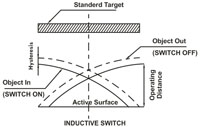| Technical Terms |
 |
Sensing Distance:- This is the distance between the target and the sensing face at which the switch operates. This is usually specified considering MS material as target.
Repeat a Accuracy:- This is the accuracy whereby the switch operates repeatedly at given stable operating conditions. For Inductive Switches, the accuracy is better than ± 0.2 %.
Response Time:- This is the accuracy whereby the switch operates repeatedly at given stable operating conditions. For Inductive Switches,For DC switches the response time can be as low as 0.3 milliseconds but for AC switches this is around 70 milliseconds due to external load parameters.
|
 |
Flush Mounting:- Switches referred to as Flush type can be mounted inside metal body and have only frontal electromagnetic field. The sensing distance in this case is limited to 0.7 times the sensing distance specified for a non-flush type switch
Non Flush Mountng:- These type of switches should necessarily be mounted with sensing zone in metal free area. |
Supply Voltage:- For DC switches, a filtered and ripple-free regulated power supply should be used and for AC switches the supply should be EMI free as far as possible
Switching Hysterisis:- This is the differential between “Switch ON” and “Switch OFF” point of the switch. This is adjusted within limits of 5% to 15% of the specified sensing distance
Output Logic:- The output switching element (either a Transistor or Thyristor) can be normally in Closed (ON) or Open (OFF) condition. The output logic has to be very carefully selected considering the application requirement.
For specific applications, the Inductive switches above M24 size are available with built-in electromagnetic relay to give a potential free output contact for switching external loads. The output logic in this case can be NO, NC or CO (Change-over) type. Switches with a specific output logic such as Latched type, Oscillator type are available on request.
Load Current:- This is the maximum current, which the switch can either sink from or source to the external load.
Applicable Standards:- Following standards are being followed for design & manufacture
IS -13947, UL-508, EN 61000-3-3 & EN61000-3-4, CSA 22.2. NO.14-95/td>
|







